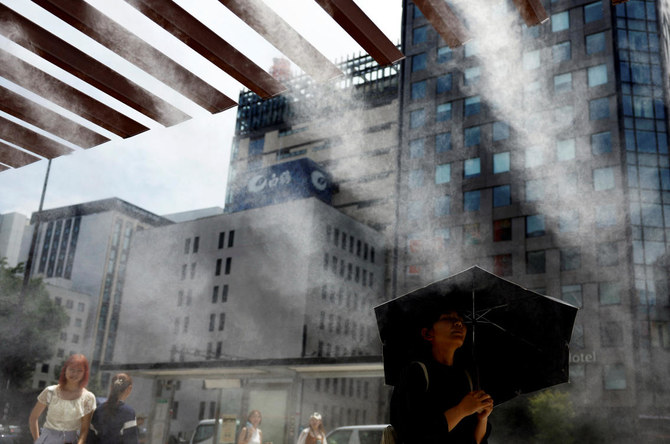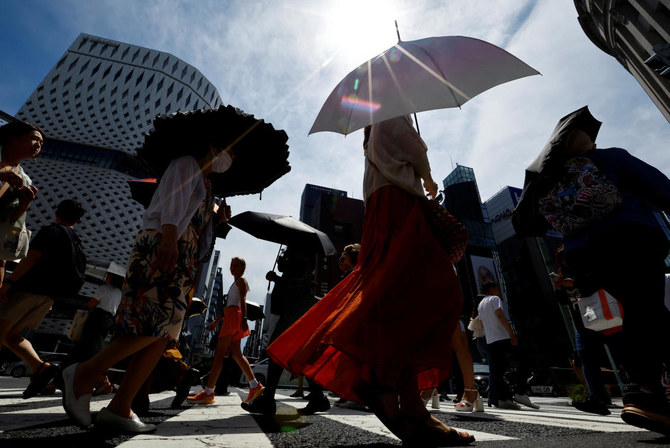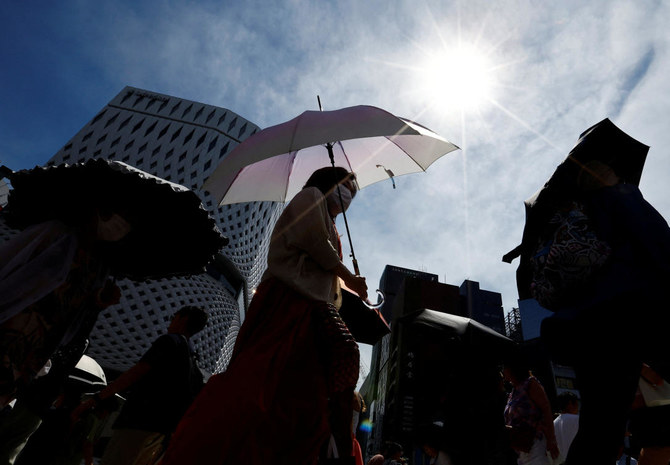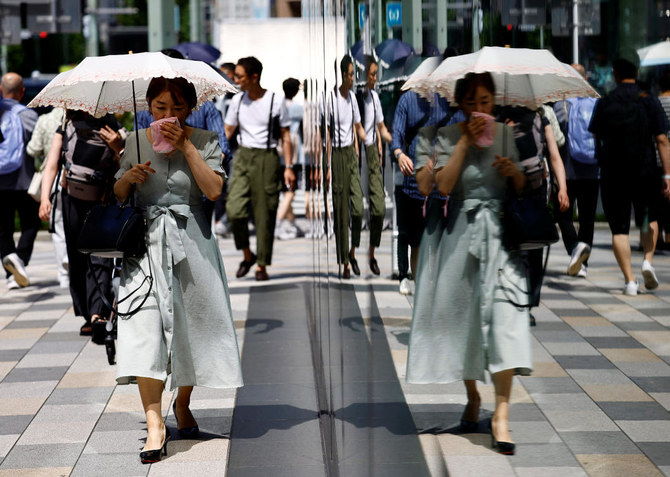TOKYO: Six people have died of heatstroke in Tokyo as Japan swelters under a rare rainy season heatwave, prompting authorities to issue a flurry of health warnings.
Over the weekend, the central Shizuoka region became the first in Japan to see the mercury reach 40 degrees Celsius (104 Fahrenheit) this year, far surpassing the 35-degree threshold classified by weather officials as “extremely hot.”
Such severe heat in the middle of Japan’s rainy season is “rather rare,” caused in part by a strong South Pacific high-pressure system, a weather agency official told AFP.
Temperatures also hit record highs near 40 degrees Celsius on Monday at observation posts in Tokyo and in the southern Wakayama region, according to local media.
The past few days have seen authorities issue heatstroke alerts in much of the country, urging residents to avoid exercising outside and to use air conditioning.
The capital logged three deaths linked to heatstroke on Saturday and three more on Monday, when the mercury hovered around 35 degrees Celsius at midday, according to the city’s medical examination office.
“Without the AC on, I find it difficult to survive,” Tokyo resident Sumiko Yamamoto, 75, told AFP, adding she feels “it’s gotten drastically hotter” since last year.
“Through the advice given on TV, I try to stay hydrated as much as possible. Because I’m old, I’m being careful not to collapse,” she said.
Heatstroke is particularly deadly in Japan, which has the second-oldest population in the world after Monaco.
Yamamoto’s age puts her in the demographic flagged by health experts as particularly vulnerable to heatstroke, along with infants and those living alone or who are too poor to afford air conditioning.
The Japanese Association for Acute Medicine on Monday warned of the rising death toll from heat exhaustion nationwide, which grew from just a few hundred per year two decades ago to around 1,500 in 2022.
The sheer number of fatalities suggests that heatstroke now poses a danger on par with that of “a major natural disaster,” the group said, warning against non-essential outings.
Tokyo business executive Mikio Nakahara, 67, says the difference between Tokyo 50 years ago and now is stark.
“Tokyo wasn’t as hot as it is now,” he told AFP.
But these days, “I try to work remotely as much as possible so I don’t have to go outside.”
With ever-hotter summers becoming the norm around the world, tourists like Ainhoa Sanchez, 29, aren’t too surprised by Tokyo’s temperatures.
“So the plan is going sightseeing a little bit. Drinking a lot of liquids. Maybe when we get too hot, we can get into a shop, look around, chill a bit and then go back to the street,” she told AFP.
Six dead in Tokyo as Japan swelters in heatwave
https://arab.news/648x2
Six dead in Tokyo as Japan swelters in heatwave

Uruguay’s ex-president Jose 'Pepe' Mujica dead at 89

- Jose 'Pepe' Mujica was a guerrilla fighter and hero of the Latin American left
- Mujica won fame as the 'world’s poorest president' for giving away much of his salary to charity
MONTEVIDEO: Uruguay’s former president Jose “Pepe” Mujica, a guerrilla fighter and hero of the Latin American left, has died at the age of 89, the government in Montevideo said Tuesday.
“With deep sorrow, we announce the passing of our comrade Pepe Mujica. President, activist, guide and leader. We will miss you greatly, old friend,” the country’s current president, Yamandu Orsi, said on X.
Mujica won fame as the “world’s poorest president” for giving away much of his salary to charity, during his 2010-2015 presidency.
In May 2024, he was diagnosed with cancer of the esophagus, which later spread to his liver.
His wife Lucia Topolansky said this week he was receiving palliative care.
The man who made Uruguay into a paragon of progressive politics by legalizing abortion, gay marriage and the use of recreational cannabis, campaigned for the left until the end.
In a November 2024 interview with AFP he described the presidential victory of his political heir, history teacher Orsi, as “a reward” at the end of his career.
The blunt-spoken, snowy-haired politician was a fierce critic of consumer culture.
As president he walked the talk by actively rejecting the trappings of office.
He attended official events in sandals and continued living on his small farm on the outskirts of Montevideo, where his prized possession was a 1987 Volkswagen Beetle.
Tupamaros movement
In the 1960s, he co-founded the Marxist-Leninist urban guerrilla movement Tupamaros, which started out robbing from the rich to give to the poor but later escalated its campaign to kidnappings, bombings and assassinations.
During those years, Mujica lived a life of derring-do. He sustained multiple gunshot wounds and took part in a mass prison breakout.
But when the Tupamaros collapsed in 1972, he was recaptured and spent all of Uruguay’s 1973-1985 dictatorship in prison, where he was tortured and spent years in solitary confinement.
After his release, he threw himself into politics and in 1989 founded the Movement of Popular Participation (MPP), the largest member of the leftist Broad Front coalition.
Elected to parliament in 1995, he became a senator in 2000 and then agriculture minister in Uruguay’s first-ever left-wing government.
He served just one five-year term as president, in line with Uruguay’s term limits.
Mujica had no children and is survived by fellow ex-guerrilla Topolansky.
Carney says new govt will ‘relentlessly’ protect Canada sovereignty

- “Canadians elected this new government with a strong mandate to define a new economic and security relationship with the United States,” Carney said
- Carney replied the Canada “won’t be for sale, ever“
OTTAWA: Canada’s new government will relentlessly protect the nation’s sovereignty as it works to redefine fraught relations with the United States, Prime Minister Mark Carney said Tuesday as his cabinet was sworn in.
Carney’s election win two weeks ago was largely defined by threats from President Donald Trump, whose trade war and repeated talk of annexing the United States’ northern neighbor upended Canadian politics.
Carney, a former central banker with experience leading through major financial crises, convinced enough voters that he was the right choice to take on Trump, whose tariffs on imported autos and other goods have already cost Canadian jobs.
“Canadians elected this new government with a strong mandate to define a new economic and security relationship with the United States,” Carney said in a statement before his new ministers took their oaths.
Addressing reporters after the ceremony, with a cabinet of Liberal Party loyalists assembled behind him, Carney said his “government will work relentlessly to keep Canada secure as a sovereign nation.”
Trump discussed absorbing Canada into the United States on several occasions in his first Oval Office meeting with Carney last week.
The president insisted it would be a “wonderful marriage” if Canada agreed to his repeated calls to become the 51st US state.
Carney replied the Canada “won’t be for sale, ever,” and referenced the deep hostility among Canadians toward the prospect of a political union with the United States.
Carney’s cabinet retains several key figures involved in negotiating with the Trump administration over tariffs, although some job titles have shifted.
Dominic LeBlanc, who has dealt directly with US Commerce Secretary Howard Lutnick in recent weeks, has been named the minister responsible for Canada-US trade.
Former foreign minister Melanie Joly has been moved to industry minister, with Anita Anand replacing her as Canada’s top diplomat.
Finance Minister Francois-Philippe Champagne is keeping his post.
Since taking over from Justin Trudeau on March 14 as prime minister, Carney has tried to create distance from the previous Liberal regime, which became deeply unpopular over its decade in power.
His cabinet includes Trudeau allies, but also brings in new faces.
Evan Solomon, a prominent former journalist entering parliament for the first time, has been named minister for artificial intelligence, a new post nodding at Carney’s pledge to transform Canada’s economy.
Carney said his cabinet will be focused on a “core mission,” which is “to create the strongest economy in the G7.”
He promised to act fast on a middle class tax cut and remove inter-provincial trade barriers by Canada Day, on July 1, a move some economist believe could soften the impact of Trump’s tariffs.
Carney had a lucrative career as an investment banker before serving as the governor of the Bank of Canada and Bank of England.
He is a political novice who will be new to parliament when the House of Commons reconvenes on May 27, opening with a throne speech by King Charles III, the head of state in Canada, a member of the British Commonwealth.
But Carney assured voters his experience in the private sector and as a central banker will help him rebuild Canada’s economy, a message that resonated with voters.
Opinion polls showed the Liberals trailing the Conservatives by more than 20 points at the start of the year, but Carney’s replacing Trudeau, combined with Trump’s threats, sparked an unprecedented comeback.
The Liberals fell just short of the 172 seats needed for majority control of Parliament, but with 170 confirmed wins they will be in a strong position to pass legislation.
Sweden detains suspected spy, TV reports diplomat in custody

- The suspect had been posted to a number of embassies around the world
- SAPO was investigating a potential connection between the suspect and the resignation of the government’s national security adviser last week
STOCKHOLM: Sweden’s security service has detained a Swedish diplomat on suspicion of espionage, public television SVT reported on Tuesday, citing unidentified sources.
The security service (SAPO) said it had detained a person on suspicion of spying after an operation in the Stockholm area in the last few days, but declined to give further information.
“It is correct that we have a case where the suspicion is spying,” SAPO spokesperson Karin Lutz told Reuters. “One person has been taken into custody.”
SVT said the suspect had been posted to a number of embassies around the world and that SAPO was investigating a potential connection between the suspect and the resignation of the government’s national security adviser last week.
A security service spokesperson said SAPO had noted the media report but declined to comment further.
“The investigation is at an early stage and we cannot say anything due to secrecy considerations,” the spokesperson said.
Tobias Thyberg, a foreign service veteran who in previous roles served as ambassador to both Ukraine and Afghanistan, resigned a day after being named as national security adviser.
Thyberg is not suspect in a crime, SVT said. Thyberg’s predecessor stepped down in January and was then charged with negligent handling of classified information.
Anton Strand, the lawyer appointed to defend the person in custody, told newspaper Aftonbladet his client denied wrong-doing and had filed a criminal complaint against the police over the arrest. He did not immediately respond to Reuters’ attempts to reach him by phone and email.
Swedish authorities have fretted in recent years about increasing threats from both foreign powers like Russia, China and Iran and groups engaging in actions ranging from violent attacks and hybrid warfare to corporate espionage.
In March, SAPO warned that foreign powers are operating in ways that threaten security, using hybrid activities to destabilize Sweden and Europe.
Justice Minister Gunnar Strommer told SVT the government had been informed of SAPO’s operation and the person in custody was suspected “on reasonable grounds” of espionage. Reasonable grounds is the lower of two grades of suspicion in Sweden.
“The investigation has to be carried out and I don’t want to preempt it,” Strommer said in a statement to SVT.
Man in jail for nearly four decades for murder acquitted by London court

- Peter Sullivan was sentenced to life in 1987 for the murder of 21-year-old Diane Sindall
- “Our client Peter Sullivan is the longest-serving victim of a miscarriage of justice in the UK,” said his lawyer
LONDON: A man who has spent nearly 40 years in jail for murder had his conviction overturned by a London court on Tuesday after advancements in DNA testing techniques cast doubt on his guilt.
Peter Sullivan, believed to be the victim of the longest miscarriage of justice in Britain, was sentenced to life in 1987 for the murder of 21-year-old Diane Sindall, who was found dead after leaving her place of work in the northwest England town of Bebington, close to Liverpool, the previous year.
He applied to the Criminal Cases Review Commission — an independent body that investigates potential miscarriages of justice — in 2021, raising concerns about his police interviews, bite-mark evidence presented in his trial, and what was said to be the murder weapon, the commission said in a statement.
The commission then obtained DNA information from samples taken at the time of the offense and found that the profile did not match that of Sullivan. His case was then sent to London’s Court of Appeal, which quashed the conviction on Tuesday based on the new evidence.
“This is an unprecedented and historic moment. Our client Peter Sullivan is the longest-serving victim of a miscarriage of justice in the UK,” his lawyer told reporters outside the court.
Reading a message from Sullivan, the lawyer said: “What happened to me was very wrong, but it does not detract or minimize that all of this happened off the back of a heinous and most terrible loss of life.”
Sullivan had applied to the CCRC questioning DNA evidence in 2008, but forensic experts advised at the time that any further testing would be very unlikely to produce a DNA profile.
The techniques used in the testing that led to his case being referred were not available at the time of his first application, the CCRC said.
Merseyside Police, which reopened the investigation in 2023, said there was no match for the DNA identified on the national DNA database, adding that they were committed to doing “everything within our power” to find to whom it belonged.
“The truth shall set you free ... As we advance toward resolving the wrongs done to me, I am not angry, I am not bitter,” Sullivan said in his message.
Over 84,000 people affected by Somalia floods since mid-April: UN

- “Since mid-April, flash floods caused by heavy seasonal rains have killed 17 people and affected over 84,000 people in several areas,” OCHA said
- “Critical infrastructure has been damaged“
NAIROBI: More than 84,000 people have been affected by flash floods in Somalia since mid-April, the United Nations said Tuesday, leaving at least 17 people killed.
The Horn of Africa is one of the regions most vulnerable to climate change, and extreme weather events are becoming increasingly frequent and intense.
“Since mid-April, flash floods caused by heavy seasonal rains have killed 17 people and affected over 84,000 people in several areas,” UN humanitarian agency OCHA said.
The figure includes people who have displaced, lost shelter, now have a lack of access to humanitarian assistance, or suffer water shortages.
Jubaland, Hirshabelle, South West, Galmudug, Puntland states and Banadir region — which includes capital Mogadishu — were most impacted, OCHA said, leaving more than 8,100 people displaced.
“Critical infrastructure has been damaged,” it added, noting that water points had been submerged and almost 200 latrines were destroyed.
It comes just days after torrential rain in southeastern Banadir killed at least nine people and affected approximately 24,600 others.
“The rains significantly impacted internally displaced people,” OCHA said, citing local authorities.
According to the UN report, meteorologists have warned that more rain is expected in the coming days across southern and central Somalia.
Somalia was hit by intense floods in 2023. More than 100 people were killed and over a million displaced after severe flooding caused by torrential rains linked to the El Nino weather pattern.























